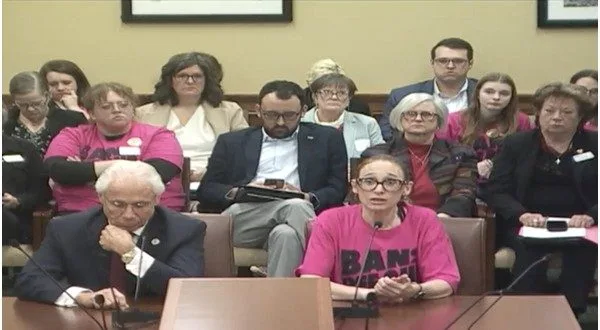
Holly Skipper (right) speaks in support of House Bill 1915, sponsored by Rep. Jon Eubanks (left), R-Paris, before the House Public Health, Welfare and Labor Committee on Tuesday, April 8, 2025. (Screenshot via Arkansas Legislature)
An Arkansas House committee approved a bill Tuesday that would allow households receiving food stamps to save more of their income or own more assets.
Arkansas is one of 13 states with an asset limit for Supplemental Nutrition Assistance Program (SNAP) recipients, and the state aligns with the federal limit of $3,000. House Bill 1915 would double the limit to $6,000 and require it to be adjusted for inflation every two years.
The House Public Health, Welfare and Labor Committee passed the bill on a split voice vote. On Thursday, committee members said they were hesitant to vote without knowing how much the policy would cost the state.
The administrative cost to the Department of Human Services would be $87,500, according to the requested fiscal impact statement from the agency.
DHS Secretary Kristi Putnam told the committee she still opposed the bill, repeating her statement from Thursday that the state should let Act 675 of 2023 take effect first.
Act 675 kept the federal asset limit but authorized a USDA waiver request to allow exemptions for individual families with more assets. Those families would have a new asset limit of $5,500 and remain enrolled in SNAP as long as they receive an exemption within a year of exceeding the current limit, and they would only be allowed one exemption every five years.
Assets include cash on hand and in the bank, savings certificates and stocks and bonds, among other things. HB 1915 would repeal Act 675 and replace it with the $6,000 asset limit.
Sen. Jonathan Dismang, R-Searcy, sponsored Act 675 and is sponsoring HB 1915. He expressed frustration in January and again last week that DHS has not yet implemented Act 675. The Arkansas Legislative Council’s Executive Subcommittee approved an emergency rule Thursday to enact the policy.
Earlier versions of Act 675 would have raised the asset limit to $12,500 and then to $6,000. Gov. Sarah Huckabee Sanders said at the time that she opposed making people more dependent on government benefits, a sentiment echoed Thursday by Opportunity Arkansas CEO Nicholas Horton and Tuesday by Nick Stehle, a visiting fellow at FGA Action.
Rep. Jon Eubanks, R-Paris, is HB 1915’s House sponsor and told the Public Health committee that the bill will give SNAP recipients a path to no longer needing food stamps.
Rep. Aaron Pilkington, R-Knoxville, said he supported providing “off-ramps” for Arkansans on government assistance, based on his past work with Section 8 housing assistance recipients.
“They would get a job, they’re working, they’re doing everything we want them to do, but then unfortunately they would get a promotion and potentially would lose their housing, so they wouldn’t take the promotion,” Pilkington said.
Public testimony
Three members of the public spoke in favor of HB 1915, with two saying they personally benefited from SNAP and saw the asset limit as a barrier to developing financial stability and food security.
Brittany Stockton told the committee she enrolled herself and her three daughters in public assistance a few years ago after leaving a dangerous situation.
“Had we had savings, we would have been better off, but I wouldn’t have been eligible for the benefits that I had,” said Stockton, who added that she has worked two jobs for two years and no longer qualifies for benefits.
Holly Skipper said she also works two jobs and had to reduce her hours at one of them in order to receive SNAP benefits, which she received on Saturday, four months after applying. She is both a full-time student and a full-time caregiver for her husband and adult son, the latter of whom receives disability benefits, she said.
“Not only did I have to account for every dime that I was making in the two part-time jobs I had, plus school, plus my son’s money, but I spent days and days crying, wondering which job I was going to have to quit so that I could afford to be able to feed my son and feed my partner,” Skipper said.
Because of the SNAP asset limit, DHS required Skipper to explain why she owns a vehicle before approving her application; she explained she needs it to get her husband to his medical appointments, she said.
“People aren’t just out there trying to stay down,” Skipper said. “We’re trying to get some help, and we’re trying to get a leg up so we can help other people.”
The federal asset limit of $3,000 isn’t even one month’s worth of savings in case of an emergency, said Christin Harper, policy director for Arkansas Advocates for Children and Families, the third person to speak for the bill. AACF called for the removal of the asset limit in a January report.
Harper reminded the committee that Arkansas has the nation’s highest rate of food insecurity, at nearly 19% in 2023, according to a U.S. Department of Agriculture report released in September. The report defines food insecurity as being unable, at some time during the year, to provide adequate food for one or more household members because of a lack of resources.
Food insecurity for Arkansas children is higher at 24.2%, which accounts for more than 168,000 children, according to Feeding America.
Arkansas Hunger Relief Alliance Advocacy Director Lance Whitney expressed support for HB 1915 last week.
The full House is expected to vote on HB 1915 Wednesday.
To view this story, or for more news updates from Arkansas Advocate, click here.
WebReadyTM Powered by WireReady® NSI










